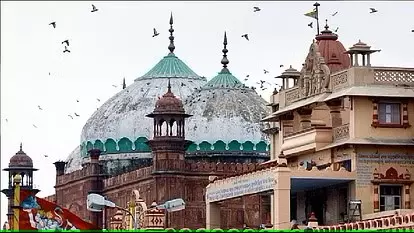
Hindu side alleges ‘fraud’ in reaching 1968 comprise agreement on Shahi Idgah case
text_fieldsIn a development in the longstanding dispute over the Krishna Janmabhoomi-Shahi Idgah mosque in Mathura, Uttar Pradesh, Hindu petitioners have petitioned the Allahabad High Court, contending that a compromise reached in 1968 was based on fraudulent practices.
The compromise of 1968, brokered between the Sri Krishna Janmasthan Seva Sansthan and the Shahi Idgah Trust, saw the temple committee relinquishing a portion of land to the mosque, where it currently stands.
This agreement delineated boundaries for both places of worship, with a wall erected to separate them, with the stipulation that the mosque should have no openings facing the temple.
However, the Hindu petitioners now challenge the validity of this compromise, alleging that it was obtained through fraudulent means. They assert that the birthplace of the Hindu deity Krishna was destroyed in the 16th century, with a platform constructed in its place, which later became the Idgah. Consequently, they demand full ownership of the 13.37 acres of land surrounding the mosque, claiming it as the birthplace of Lord Krishna.
During the court proceedings, counsel for the Hindu parties argued that the deity Krishna was not represented in the 1968 compromise nor the subsequent 1974 suit. Furthermore, they contended that Sri Krishna Janmasthan Seva Sansthan lacked the authority to enter such agreements, as its mandate was solely to manage the temple's daily affairs.
On the other side, representing the Muslim contingent, advocate Taslima Aziz Ahmadi emphasized that the suit filed by the Hindu petitioners was time-barred, as per legal limitations. She pointed out that the challenge to the compromise should have been made within three years, whereas the current suit was filed in 2022.
Meanwhile, the Supreme Court extended its stay on the Allahabad High Court's order, which had permitted a court-monitored "scientific survey" of the mosque. This decision came after the High Court's allowance of a petition demanding the appointment of a court commissioner to inspect the mosque, adjacent to the Krishna Janmabhoomi temple.
In response to these developments, the mosque management committee approached the Supreme Court, citing the Places of Worship Special Provisions Act, 1991. They argued that any alteration in the character of religious sites after Independence is prohibited under this legislation.
Additionally, they contended that the High Court should have addressed their plea for the rejection of the plaint by the Hindu parties before entertaining miscellaneous applications related to the suit.























